News & Announcements
- Details
- Written by Joshua Wachtel
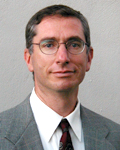 Miguel Tello, Representative for IIRP Latinoamérica, has been elected to the IIRP Board of Trustees.
Miguel Tello, Representative for IIRP Latinoamérica, has been elected to the IIRP Board of Trustees.
“I am delighted to be able to serve on the Board,” says Tello. “I have great respect and admiration for the IIRP and its efforts to make our world a more restorative place.”
Originally from Mexico, Tello now lives and works in San Jose, Costa Rica. He first got involved with the IIRP when he contacted IIRP founder Ted Wachtel for permission to translate Wachtel’s article “Restorative Justice in Everyday Life” into Spanish to use at a Prison Fellowship International conference. Tello then took IIRP trainings and became an IIRP trainer.
- Details
- Written by Joshua Wachtel
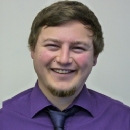
The following is a guest post by Ian D. Marder, Ph.D. student, School of Law, University of Leeds, UK and founder, Community of Restorative Researchers.
This article argues in favor of the establishment of a national organization in the United Kingdom which represents and is run collectively by volunteer restorative practitioners. Such an organization is now necessary given the widespread use of volunteers in restorative practices delivery in this jurisdiction. The organization would help to enable both best practice and resources to be shared by encouraging communication and collaboration between the wide array of organizations and individuals involved in the delivery of restorative practices in a voluntary capacity.
- Details
- Written by IIRP Staff
Schools
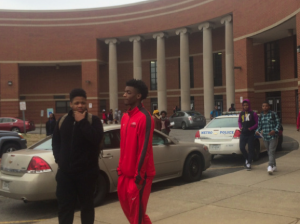 Pearl-Cohn Entertainment Magnet High School in Nashville, which uses restorative practices in discipline. Photo by Grace Tatter."To improve school discipline, improve teacher behavior" suggests an article for the Teacher Project, an education reporting initiative at Columbia’s Graduate School of Journalism, about restorative practices in San Francisco schools.
Pearl-Cohn Entertainment Magnet High School in Nashville, which uses restorative practices in discipline. Photo by Grace Tatter."To improve school discipline, improve teacher behavior" suggests an article for the Teacher Project, an education reporting initiative at Columbia’s Graduate School of Journalism, about restorative practices in San Francisco schools.
Students Taking a Right Stand (STARS) Nashville, an IIRP licensee, is helping Metropolitan Nashville Public Schools students "Talk it out" rather than get suspended or expelled. (STARS CEO Roger Dinwiddie will be participating in the IIRP's Presidential Symposium: Integrating School Climate Reform Efforts, July 20-21, 2015.)
"The Rock Star Principals" from Downington, Pennsylvania, reflect during their podcast upon how a new study showing that "Suspensions Hurt 'Good Kids', Too" supports their own argument for restorative practices.
- Details
- Written by Joshua Wachtel
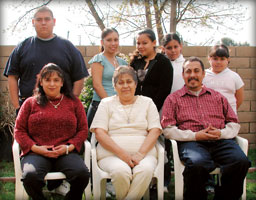 A family satisfied with their FGDM, the North American term for a Family Group Conference, from the Family Voices videoIn spring 2014, the Dutch parliament approved an amendment to the country’s Law on Child Welfare that gives every citizen of the Netherlands, as of January 1, 2015, the right to make their own plan first when social services has been called upon to intervene in the care of a child or adolescent.
A family satisfied with their FGDM, the North American term for a Family Group Conference, from the Family Voices videoIn spring 2014, the Dutch parliament approved an amendment to the country’s Law on Child Welfare that gives every citizen of the Netherlands, as of January 1, 2015, the right to make their own plan first when social services has been called upon to intervene in the care of a child or adolescent.
Rob Van Pagée, founder of the Dutch NGO Eigen Kracht Centrale, heralds the law as an important step in the development of what he calls the “new welfare state,” in which decisions that most affect people’s lives can be made by them and their communities of support.
“Citizens now have a right to first make a ‘family group plan,’” says Van Pagée.
- Details
- Written by Joshua Wachtel
Eigen Kracht Centrale, Dutch for "Our Power," is an NGO operating throughout the Netherlands that provides independent coordinators for organizing Family Group Conferences (FGCs). The FGC is a process that provides a structure to bring together extended family, close friends, and sometimes appropriate members of the community, to help a family or individual develop a plan to care for a child, secure housing, find work, confront addiction, obtain medical assistance or address other crucial issues that might affect children or youth in a family, rather than a judge, social worker or other professional making a plan for them. FGCs are also being used around the world in schools, prisons, communities and other contexts.
The following video trailer sets the stage for an Eigen Kracht FGC that was held in a small community that was struggling with a variety of issues that were negatively affecting the quality of life in the village.
- Details
- Written by Joshua Wachtel
IIRP Lecturer Elizabeth Smull, who presented on restorative practice at the International Bullying Prevention Association's annual conference, says she left feeling excited about how people from around the world are beginning to speak a common language about creating safety and community in schools.
- Details
- Written by Joshua Wachtel
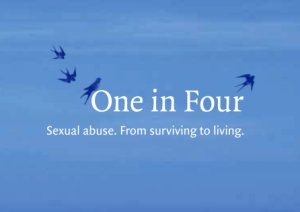 One in Four, a Dublin, Ireland-based organization that works to support adult victims of childhood sexual abuse, as well as sexual offenders and their respective families, aspires to make the world a place where all children are safe from sexual violence. Sadly, though, research shows that currently one-in-four people in Ireland experience sexual violence at some time during their lives.
One in Four, a Dublin, Ireland-based organization that works to support adult victims of childhood sexual abuse, as well as sexual offenders and their respective families, aspires to make the world a place where all children are safe from sexual violence. Sadly, though, research shows that currently one-in-four people in Ireland experience sexual violence at some time during their lives.
The organization, which since 2002 has offered advocacy and psychotherapeutic services to survivors of sexual violence, has, since 2012, sought professional development from IIRP Europe so it can offer restorative services for clients and provide a new level of support and structure for staff.
- Details
- Written by Joshua Wachtel
Schools
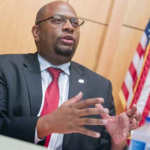 NEA Executive Committee member Kevin GilbertNews from the two largest U.S. teachers’ unions: The National Education Association seeks to shut down the school-to-prison pipeline, while American Educator, the journal of the American Federation of Teachers, recommends restorative practices.
NEA Executive Committee member Kevin GilbertNews from the two largest U.S. teachers’ unions: The National Education Association seeks to shut down the school-to-prison pipeline, while American Educator, the journal of the American Federation of Teachers, recommends restorative practices.
A new publication, Bullying, Teen Aggression & Social Media, launches this month and will include pieces relevant to restorative practices. Subscriptions are now available; the editors also seek contributions on the topic of bullying and social media.
- Details
- Written by Joshua Wachtel
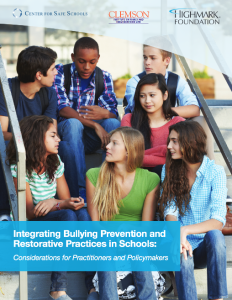 Teachers, parents, students, administrators and the public agree that bullying is a serious problem, both within and outside the school community. Organizations like Olweus Bullying Prevention Program (OBPP) have been working for decades to address this issue.
Teachers, parents, students, administrators and the public agree that bullying is a serious problem, both within and outside the school community. Organizations like Olweus Bullying Prevention Program (OBPP) have been working for decades to address this issue.
Working in parallel, approaches like restorative practices, bullying prevention, Positive Behavioral Interventions and Supports (PBIS), social and emotional learning (SEL) and various school climate initiatives address the need for safer and healthier school environments as a prerequisite for quality learning.
- Details
- Written by Laura Mirsky
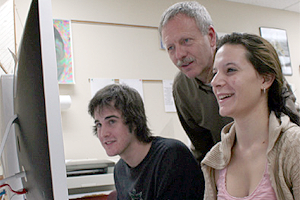 Giving students voice and choice is essential to creating engaged learners. It’s vital that teachers value students’ life experiences and incorporate them into the learning process, enabling them to internalize what is being taught. Additionally, in a restorative classroom, learning is a shared responsibility between the students and the teacher — a natural extension of CSF Buxmont’s restorative culture.
Giving students voice and choice is essential to creating engaged learners. It’s vital that teachers value students’ life experiences and incorporate them into the learning process, enabling them to internalize what is being taught. Additionally, in a restorative classroom, learning is a shared responsibility between the students and the teacher — a natural extension of CSF Buxmont’s restorative culture.
“We have high expectations for students. We put them in the driver’s seat to take responsibility for their education, engaging them and having them be a part of the process,” explains Pam Thompson, Assistant Director of School/Day Treatment.

Restorative Works Year in Review 2024 (PDF)
All our donors are acknowledged annually in Restorative Works.
